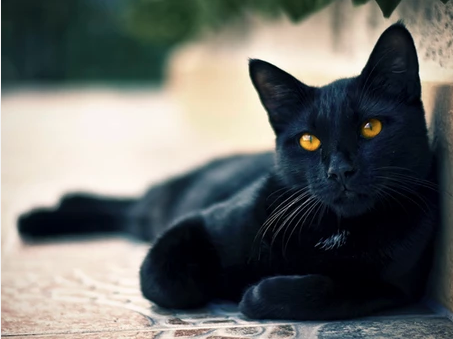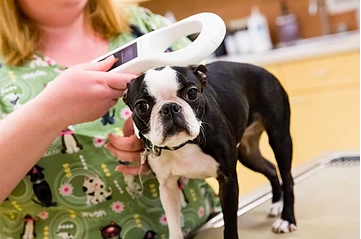WHAT MAKES A BLACK CAT…BLACK?
Generally, when you think of a black cat, what breed comes to mind? Don’t know? Don’t feel bad, I didn’t have a clue either and I own two black furry kitty children. Surprisingly, the Cat Fanciers’ Association (CFA) recognizes 22 different cat breeds that have all black coats. These cats are called “solids” or “selfs” since they maintain one solid color in their fur pigmentation.
For some reason, I made the ostentatious assumption that black fur was a result of a dominant gene, resulting in an overpopulation at adoption clinics. Well, silly me and my biological science degree, I was most definitely wrong. The black coat is actual a recessive gene that suppresses the dominant tabby-like coat pattern.
Surprisingly, this actually makes sense that tabby coats are a dominant allele because in the wild, the tabby coating would serve as excellent camouflage when stalking their prey in tall grass or in dry foliage. This gene would thus propagate successfully and prominently in the surviving breeds and the majority of the living meowsers you see today. Yay, school did pay off…sort of.
Ok, so we get why their fur represents a black color, but what exactly makes this more scary and oogalee boogalee to people across the globe? Well, now we must dive into my least favorite subject in school of all, the history behind these black cat superstitions.
A BRIEF HISTORY OF BLACK CAT SUPERSTITIONS
Black Cats in Egypt
Once upon a glorious time (besides currently in my household), black cats were actually considered divine creatures. In 2800 BC during the Early Dynastic Period of Ancient Egypt, a goddess by the name of Bastet was worshipped by the Egyptians. This goddess was not only a protector of all lower Egypt, she also the Goddess of War and was responsible for protecting the pharaoh. Bastet took the form of a gorgeous black cat, which has now birthed inspiration in me for next year’s Halloween costume.
When cats were eventually domesticated in Egypt, people thought black cats were direct descendants of Bastet. Black cats were treated with the utmost respect, and these little furry friends protected food stocks from mice and other invaders, because you know, fridges didn’t exist…for cats to jump on top of randomly, that is. Egyptians had so much love and respect for their feline family members that they were even embalmed and mummified when they passed on to kitty heaven. Heck, these kitties get better treatment than some people’s deceased family members!
Black Cats in the Middle Ages
However, these darkened fur balls did not bask in the glorious spotlight of awesome for long. During the Middle Ages, black cats became associated with “witchcraft” and “satanism” according to the European church. Back then, these unassuming felines were accused of being companions and accomplices to witches. It was also believed that black kitties had powers to foresee death. Some even believed that witches would able to shape-shift into the black felines and roam the physical world in their cat bodies.
To me, this sounds metal and awesome, but apparently the Middle Ages weren’t down with the brutality. This makes sense since these times were dominated by the Christian religion. Before Christianity became so widespread, polytheistic worship was commonly practiced. However, when monotheistic Christianity was introduced, any god that was not the Christian god was immediately associated as “satanic.” Thus, when any idea or any thing magical or unexplained by the bible came to light, such as a black cat’s mysterious crafty nature, it was immediately CATegorized as demonic.
THE BLACK CATS OF GOOD LUCK
Fortunately, not every culture sees the black cat as the enemy. In Japan, it is said that a single woman with one black cat is bound to have many suitors. In Asian culture, cats are considered a good luck symbol and represent prosperity. Have you ever been to Chinatown and seen the little ceramic gold cat with the raised paw? Yeah, the Chinese call him Lucky Cat.
In England, black cats have a bit of a wishy washy role in their cultural superstitions, especially on boats (as you do). Some believe that a black cat on board of a ship is very lucky. However, pirates feel a bit oddly about the same situation. If the cat walked on board with you onto the ship, then the ship would foresee good luck and fortune. But, if the cat decided to disembark, the ship would sink. Also, it was said to be fortuitous to have black cats at home with the wives of fisherman so it would ensure their husbands would arrive home safely.
BLACK CATS TODAY
What does all this mean? Why the history lesson? Well, here’s the problem. Sadly, black cats have the lowest adoption rate and the highest rate of being euthanized. They are also declined by may rescue group since they are so difficult to place in furever homes.
There is actually no definitive reason as to why people are not thinking straight when they see these adorable creatures in cages and resist taking them home. However, some people claim that it is difficult to see the animals and feel a “connection” with them through the cages. Others are somewhat influenced by their misconceived notions of superstition.
Sadly, what most people do not understand is that black cats are generally healthier and live longer. This is because their genetic code is more differentiated than some of their pedigree cousins because of more dispersed mating of different breeds. They are also excellent hide-and-seek players and love to snuggle in the exact same way as any other cat would.
So if you’re looking to adopt a kitty any time soon, might I suggest a black cat?



